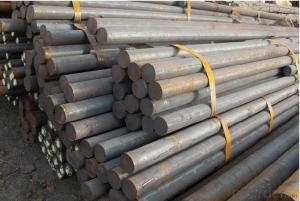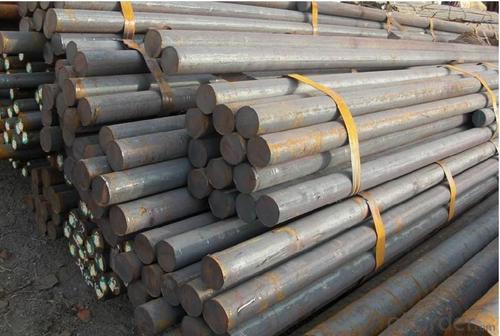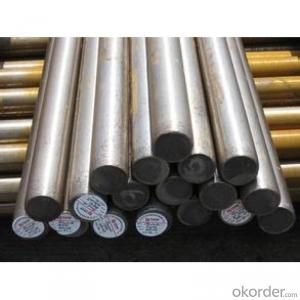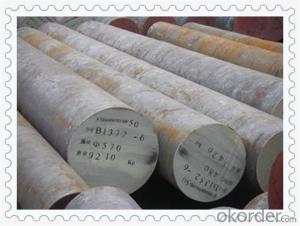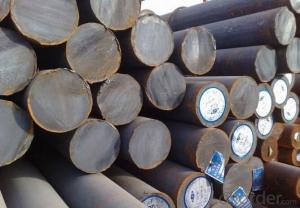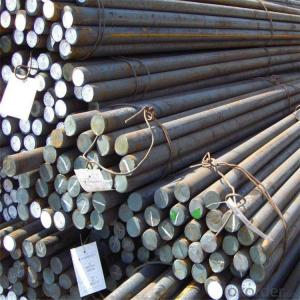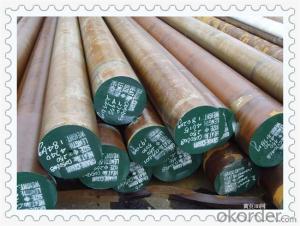ASTM 1020 Low Carbon Steel Round Bars
- Loading Port:
- Tianjin
- Payment Terms:
- TT OR LC
- Min Order Qty:
- 25 m.t.
- Supply Capability:
- 50000 m.t./month
OKorder Service Pledge
OKorder Financial Service
You Might Also Like
Specification
ASTM 1020 Low Carbon Steel Round Bars
Product Description
1. Steel grade: ASTM1020, 20#, C22, S20C
2. Length: 6M-12M
3. Diameter: 16mm-300mm
4. Product range: round bar, flat bar, square bar
5. Technique: Hot rolled, forged, cold drawn
Specification:
Material | ASTM 1020 | Round bar | Dia(mm) | 16-300mm |
Process | EAF + LF + VD + Forged + Heat Treatment (optional) | Length (mm) | Max 12m | |
Heat treatment | Normalized / Annealed / Quenched / tempered | Flat bar | Thickness(mm) | 8-500mm |
Delivery condition | Hot forged +Rough machined (black surface after Q/T)+ Turned (optional) | Width(mm) | 70-200mm | |
Test | Ultrasonic test according to SEP 1921-84 D/d | Length (mm) | Max 12m |
Chemical Composition:
C | Si | Mn | Cr | Ni | Cu |
0.17~0.23 | 0.17~0.37 | 0.35~0.65 | ≤0.25 | ≤0.30 | ≤0.25 |
Packing and Delivery:
Packing in bundle package, or as customer's requirements.
Delivery Detail: 45 days after receiving the deposit.
Usage and Applications
1. Steel round bar is used in a large number of architectural and engineering structures. Or it can be used in construction of plants for the production of steel house frames, high-voltage transmission towers, bridges, vehicles, boilers, containers, ships, etc.
2. And we can use this kind of product on the performance of the mechanical parts if the demand is not very high.
3. Some special material steel round bar can be used for main shaft of steamer, hummer shank, with big section and supper force.
Product Show:
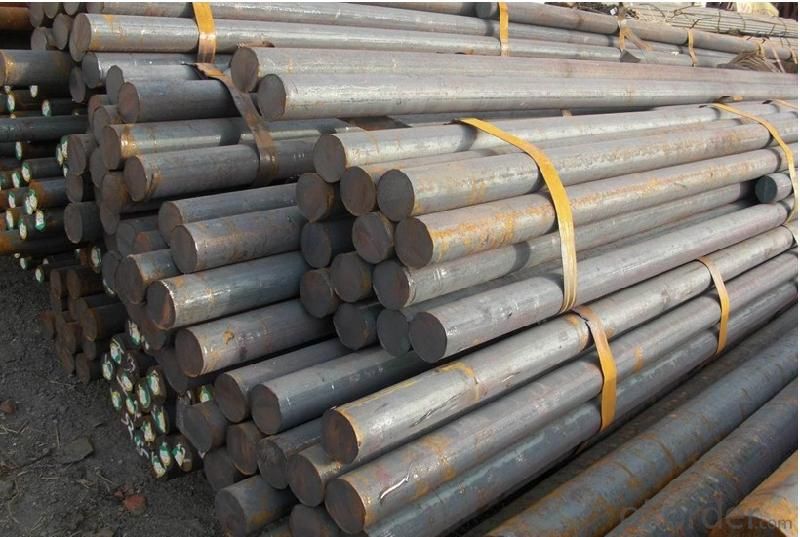
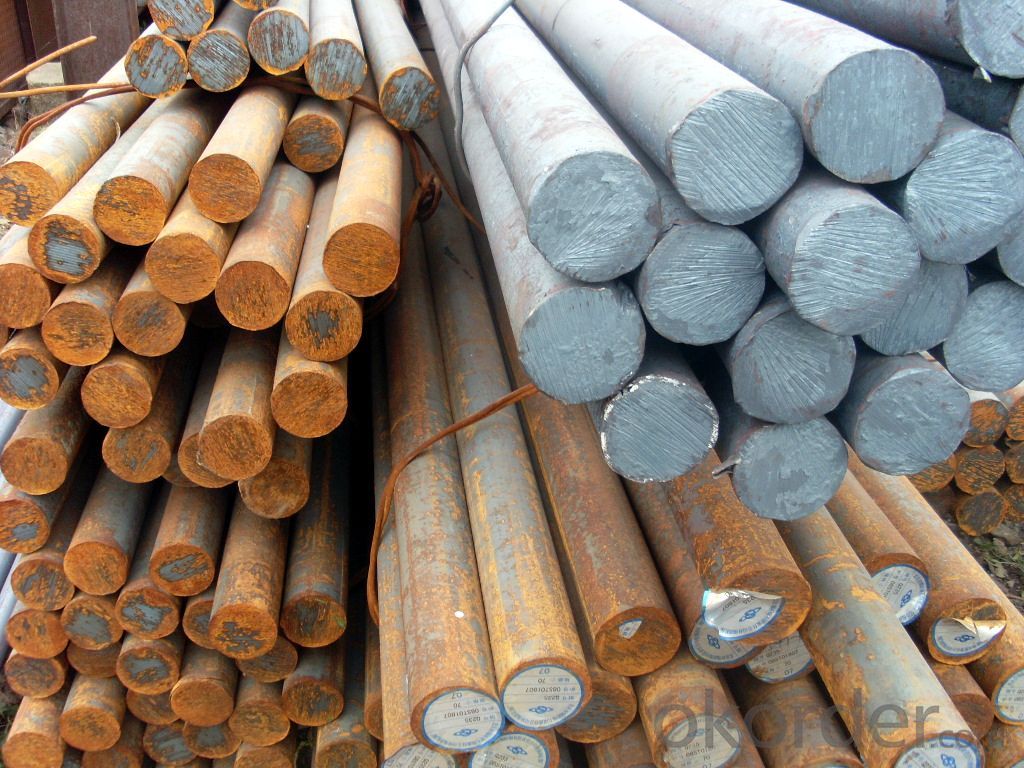
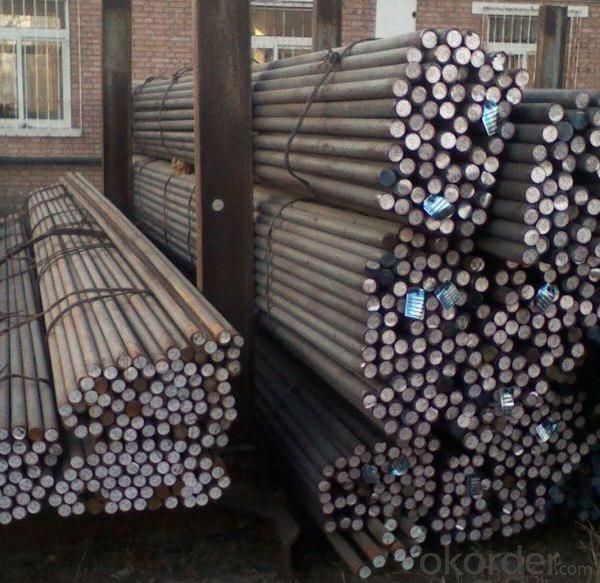
- Q: What are the main advantages of using special steel in the marine industry?
- The main advantages of using special steel in the marine industry are its high strength and durability, corrosion resistance, and ability to withstand extreme conditions. Special steel provides the necessary structural integrity to withstand the harsh marine environment, including exposure to saltwater, waves, and impact forces. It also offers excellent resistance to corrosion, which is crucial for maintaining the integrity and longevity of marine structures. Moreover, special steel's ability to withstand extreme temperatures and pressures makes it suitable for various marine applications, such as shipbuilding, offshore structures, and marine equipment.
- Q: Can special steel be used in the production of springs?
- Yes, special steel can be used in the production of springs. Special steel, such as alloy steel or high carbon steel, is often preferred for spring manufacturing due to its excellent strength, durability, and elasticity properties. This type of steel allows for the production of springs that can withstand high stress, maintain their shape, and provide reliable performance over an extended period of time.
- Q: Can special steel be used for making marine components?
- Special steel, also called marine grade steel, is specifically designed for the production of marine components due to its ability to withstand the harsh conditions of marine environments. These environments are exposed to corrosion, high humidity, and saltwater, all of which can cause ordinary steel to deteriorate rapidly. Marine grade steel is typically manufactured with additional alloys, such as nickel, chromium, and molybdenum, which provide exceptional corrosion resistance and durability. These alloys assist the steel in resisting the corrosive effects of saltwater and prevent rust formation. Moreover, special steel is frequently coated with protective coatings or treated to further enhance its corrosion resistance. Marine components produced from special steel encompass ship hulls, propellers, shafts, valves, pipelines, and various structural elements. The utilization of special steel guarantees the longevity and dependability of these components in challenging marine conditions. Furthermore, the strength and toughness of special steel enable it to withstand the high mechanical stresses and impacts encountered at sea. In conclusion, special steel is an ideal material for the production of marine components due to its superior corrosion resistance, durability, and strength. It contributes to the prolonged lifespan and reliability of marine structures and equipment in unforgiving marine environments.
- Q: What are the specific requirements for special steel used in the agricultural sector?
- Optimal performance and durability in the demanding conditions faced by the agricultural sector necessitate specific requirements for the special steel used. Key requirements for special steel in agriculture include: 1. To prevent premature deterioration and ensure a long service life, special steel used in this sector must have high resistance to corrosion, as agricultural equipment often encounters corrosive substances like fertilizers, pesticides, and animal waste. 2. Withstanding heavy loads, impacts, and vibrations during operation, special steel in agriculture must possess high tensile strength and toughness, thereby avoiding deformation or failure. 3. To maintain sharp cutting edges and prevent premature wear caused by abrasive environments with soil, rocks, and debris, special steel used in the agricultural sector should have excellent wear resistance. 4. Special steel in agriculture should have good machinability to enable easy fabrication, welding, and shaping into complex components with intricate shapes and profiles. 5. For agricultural processes involving high temperatures, such as heat treatment or exposure to hot gases, special steel used in these applications should have good heat resistance to retain its mechanical properties and structural integrity, even at elevated temperatures. 6. Balancing performance with cost is crucial for agricultural equipment manufacturers. Hence, special steel used in the agricultural sector should provide a cost-effective solution, offering desired properties at a competitive price. Meeting these specific requirements enables special steel in the agricultural sector to deliver reliable and efficient performance, contributing to the productivity and longevity of agricultural machinery and equipment.
- Q: What are the common defects found in special steel?
- Common defects found in special steel can vary depending on the specific type and manufacturing process used. However, there are a few defects that tend to be more common across different types of special steel. One common defect is surface imperfections, such as cracks, pits, or scratches. These defects can occur during the manufacturing process or can be a result of handling and transportation. Surface imperfections can affect the appearance of the steel and may also compromise its structural integrity. Another common defect is internal voids or inclusions. These are small pockets of gas or non-metallic materials trapped within the steel during the casting or forging process. Internal voids can weaken the steel and make it more prone to failure under stress. Inconsistent composition is another defect that can occur in special steel. This can happen when the alloying elements are not uniformly distributed throughout the steel. Inconsistent composition can lead to variations in mechanical properties and can make the steel less reliable and predictable in its performance. Grain structure defects are also common in special steel. These defects occur when the grains within the steel are improperly formed or are not uniform in size. Grain structure defects can affect the strength and toughness of the steel, making it more susceptible to fracture or deformation. Lastly, improper heat treatment can also result in defects in special steel. Heat treatment is a critical process in steel manufacturing, and if not done correctly, it can lead to various defects, such as excessive hardness, brittleness, or poor dimensional stability. It is important to note that while these defects are common, they can be minimized or eliminated through careful manufacturing processes, quality control measures, and proper handling and storage of the steel.
- Q: What are the specific requirements for special steel used in the oil and gas pipeline industry?
- The specific requirements for special steel used in the oil and gas pipeline industry include high strength, corrosion resistance, and toughness to withstand harsh operating conditions. The steel must also have excellent weldability and formability for ease of fabrication and installation. Additionally, it should have low sulfur and phosphorus content to prevent embrittlement and ensure long-term durability. Furthermore, the steel should possess high fracture toughness and resistance to hydrogen-induced cracking, as well as meet specific dimensional and mechanical property standards set by industry regulatory bodies.
- Q: Can special steel be used in the chemical processing equipment manufacturing industry?
- Yes, special steel can be used in the chemical processing equipment manufacturing industry. Special steel is often used in this industry due to its superior corrosion resistance, high temperature resistance, and excellent mechanical properties. It can withstand the harsh chemical environments and extreme operating conditions typically found in chemical processing equipment.
- Q: How does special steel perform in aerospace applications?
- Due to its exceptional performance and unique properties, special steel finds extensive use in aerospace applications. A primary reason for its usage lies in its high strength-to-weight ratio, a crucial factor in the aerospace industry where weight reduction is of utmost importance. Special steel alloys exhibit superior strength, enabling them to withstand the extreme conditions experienced during flight, including high temperatures, vibrations, and pressure changes. Moreover, special steel possesses excellent corrosion resistance, making it an ideal choice for aerospace applications where exposure to moisture and various chemicals is common. Its corrosion resistance ensures the durability and longevity of critical components, resulting in reduced maintenance and replacement costs. Furthermore, special steel offers excellent fatigue resistance, allowing it to endure repeated loading and unloading cycles without deformation or failure. This property is vital in aerospace applications where components must withstand cyclic stresses and maintain their integrity for extended periods. Additionally, special steel alloys can be readily fabricated and machined, facilitating the production of intricate and precise aerospace components. The ease of fabrication ensures efficient manufacturing processes and the ability to create complex designs, which are essential for optimizing performance and aerodynamics. In conclusion, special steel's exceptional strength, corrosion resistance, fatigue resistance, and ease of fabrication make it an invaluable material in aerospace applications. Its utilization in critical components, such as turbine blades, landing gears, and structural elements, guarantees the safety, reliability, and efficiency of aerospace systems.
- Q: What are the different chemical processing grades of special steel?
- There are several different chemical processing grades of special steel, including stainless steel, tool steel, high-speed steel, and alloy steel.
- Q: How does special steel resist wear and tear?
- Special steel resists wear and tear due to its unique composition and manufacturing process. It is made with a higher percentage of alloying elements such as chromium, nickel, and molybdenum, which enhance its hardness, strength, and corrosion resistance. This increased hardness enables the steel to withstand abrasion, friction, and impact, making it highly durable and resistant to wear and tear. Additionally, special steel undergoes specialized heat treatments and mechanical processes that further enhance its toughness and resistance to deformation, contributing to its ability to withstand harsh and demanding conditions without significant deterioration.
Send your message to us
ASTM 1020 Low Carbon Steel Round Bars
- Loading Port:
- Tianjin
- Payment Terms:
- TT OR LC
- Min Order Qty:
- 25 m.t.
- Supply Capability:
- 50000 m.t./month
OKorder Service Pledge
OKorder Financial Service
Similar products
Hot products
Hot Searches
Related keywords
